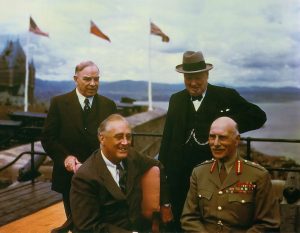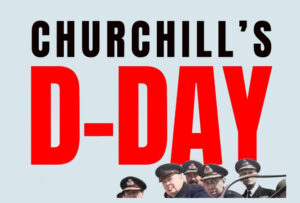StoryElement
Winston Churchill and D-Day

Winston Churchill, Parliament Square, London © Sue Lowry & Magellan PR
January 1, 1970
Written by Tim Benbow, King’s College London
‘So far the Commanders who are engaged report that everything is proceeding according to plan. And what a plan! This vast operation is undoubtedly the most complicated and difficult that has ever occurred. It involves tides, wind, waves, visibility, both from the air and the sea standpoint, and the combined employment of land, air and sea forces in the highest degree of intimacy and in contact with conditions which could not and cannot be fully foreseen.’ (Winston Churchill to the House of Commons, 6 June 1944)
The D-Day landings of 6 June 1944 were a triumph for the Allies, in which Winston Churchill could take much personal satisfaction. Here was vindication of his long-standing vision of British and American forces operating side-by-side against the common enemy. With the launch of Operation Overlord, he could now, at last, see the beginning of the end of the war in Europe.
Getting to this stage had not been without controversy. While the Anglo-American alliance is remarkable for its overall smoothness, there were some genuinely bitter debates along the way. The US Chiefs, eager to come to grips with the heart of German military power, advocated an early landing on the continent. The British in contrast, more realistic about the strength of Germany, advocated a more gradual approach that envisaged operations in North Africa, Sicily and Italy before the main invasion of north-west Europe. Many on the US side felt that the British, still in the shadow of the Somme, were too wary of fighting the Germans or even that London was focused on its post-war position in the Mediterranean and Middle East. This was unfair. Churchill and, even more, the Chief of the Imperial General Staff General Alan Brooke, were entirely clear that the operations in the Mediterranean were not an alternative to a major landing in France, but rather to make it possible. The campaigns there allowed German military and industrial power to be worn down; they helped to resolve arguably the principal Allied weakness in the form of their lack of shipping; they knocked Italy out of the war and tied down German reserves; they bought time for US industrial production to ramp up and also to conduct the huge build-up of American forces in Britain; and they allowed British and American forces to gain valuable experience, not least in amphibious operations. The US Chiefs of Staff – some of whom sought a higher priority for the war in the Pacific – went along with the Churchill-Brooke line with some reluctance, and only because the British were supported by President Franklin D. Roosevelt, with whom Churchill had developed a strong relationship.
Those Americans who suspected that Churchill had little intention of backing a major invasion of western Europe were wrong, yet it is not difficult to appreciate why they might have held this belief. Churchill did have a tendency to throw out proposals for imaginative military operations in peripheral theatres, often with scant attention to detail or practicalities. While this exasperated the Americans, it often infuriated his own Chiefs of Staff, as Brooke’s diaries reveal. Churchill’s pet scheme for an expedition to Dakar with the Free French in 1940, for example, resulted in an embarrassing debacle. The capture of Diego Suarez in Madagascar from Vichy in 1942 was a success but Brooke and the other Chiefs were never quite convinced that it was necessary. A succession of schemes, from the potentially useful to the madcap, from the Balkans to Norway, inevitably fostered the impression that Churchill was seeking to avoid Operation Overlord. Indeed, shortly before D-Day, he mused over a landing in Norway and advocated a descent on Bordeaux. Luckily for all concerned, and not least for Anglo-American harmony, he was successfully reined in by the British Chiefs. D-Day represented the culmination of Churchill’s maturing partnership with his own senior military advisors as well as with the US President.
Some elements of Operation Overlord were very much in line with Churchill’s personality and interests. The elaborate deception campaign, absolutely fundamental to the plan, aimed to convince the Germans that the main landings would occur later in the year, in the Pas de Calais. Churchill was fascinated by this aspect of the war, and even gave the deception effort its codename of ‘Operation Bodyguard’, from his famous comment that ‘in wartime truth is so precious that she must always be attended by a bodyguard of lies’. He had also been a strong supporter of the work of the Special Operations Executive, which he created to ‘set Europe ablaze’, and which helped to tie down and divert German forces during and after the Normandy landings.
Always intrigued by innovation, Churchill helped to instigate and sustain the ‘Mulberry’ artificial harbours. This stunning project was the answer to the difficulty the Allies faced in capturing the ports needed to supply the campaign in Europe, and his interventions were critical in keeping the project going through various problems. He also personally backed the programme of specialised amphibious vehicles for the assault, known as ‘Hobart’s Funnies’ (after the commanding officer of 79th Armoured Division, the unit responsible for their development). These vehicles, including the ‘AVRE’ (‘Armoured Vehicle, Royal Engineers’, for countering obstacles and demolishing bunkers), ‘Duplex Drive’ swimming tanks, the Crab (a tank carrying a flail to detonate mines) and the Crocodile (which mounted a flamethrower), proved invaluable in getting the assaulting infantry across and off the Normandy beaches.
The D-Day landings showed Churchill at his best and at his worst. On the one hand, he showed great statesmanship in accepting that the Supreme Allied Commander should be an American, General Dwight Eisenhower, despite knowing how bitterly this decision would disappoint the leading British candidate, his right-hand man General Brooke. On the other, he also displayed his characteristic difficulty in allowing the military commanders to get on with their job, informing Eisenhower that he would personally attend the invasion on HMS Belfast – and that if the General did not like this, he would simply arrange a commission for himself in the Royal Navy. Eisenhower received assistance from the unlikely quarter of King George VI, who threw himself on the Churchill grenade, telling his Prime Minister that he too would attend… and then when Churchill resisted, conceding that it would perhaps be better if they both sat it out.
For Churchill, as for Britain generally, the Normandy landings marked the culmination of the long road since the great evacuation from Dunkirk four years earlier and were one of his greatest moments.
Subscribe
WANT MORE?
Get the Churchill Bulletin delivered to your inbox once a month.






